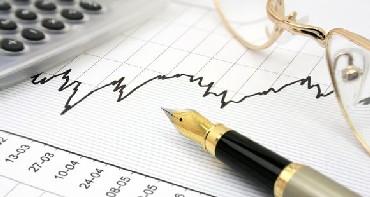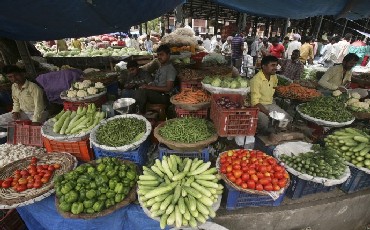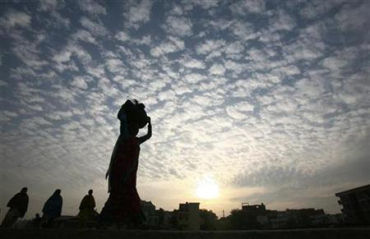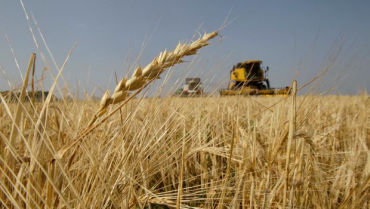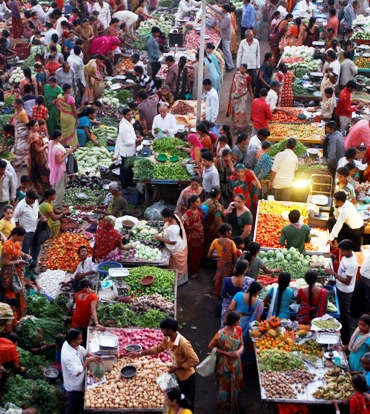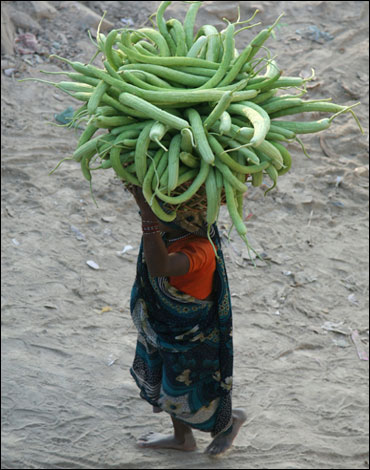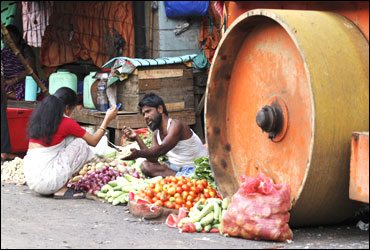 | « Back to article | Print this article |
Inflation zooms over 9%, RBI may hike interest rates
Driven by rising prices of fruits, milk, petrol and manufactured goods, headline inflation surged past the 9 per cent mark in May, raising the expectations of another hike in key policy rates by the Reserve Bank later this week.
Inflation rose to 9.06 per cent in May from 8.66 per cent in April, prompting Prime Minister's Economic Advisory Council (PMEAC) chairman C Rangarajan to describe the trend as 'upsetting' and pitch for tightening of the monetary policy by the RBI to cool rising prices.
Expressing concern over rising inflation which surged past 9 per cent in May, Finance Minister Pranab Mukherjee on Tuesday said the government would take appropriate action to contain prices.
"We would keep a close watch on developments, both domestic as well as international, in the coming months and make appropriate adjustments as we go along," he said in a statement.
Click NEXT to read on . . .
Inflation zooms over 9%, RBI may hike interest rates
The central bank, which has raised key interest rates nine times since March, 2010, to check rising prices, is slated to conduct a mid-quarterly review of the Monetary Policy on Thursday (June 16).
Pointing out that inflation for May at 9.06 per cent was lower than 10.48 per cent recorded a year ago, Mukherjee said, "The picture for the latest month is however mixed."
While food and primary inflation has declined, "core inflation (that is other than food, fuel and power inflation) continues to harden...this poses some concerns which will have to be addressed," he said.
Referring to rising prices of essential kitchen items, he said, "Other than fruits, inflation is moderating in all food items."
Click NEXT to read on . . .
Inflation zooms over 9%, RBI may hike interest rates
This decline in inflation of non-food articles, Mukherjee hoped, would help in moderating the inflationary tendency in the economy in the coming months.
The Reserve Bank of India would try to balance the need to tame inflation and promote industrial growth, which has slipped to 6.3 per cent in April from 13.1 per cent a year ago.
"I think the inflation numbers are in a sense upsetting... We need to address the issue of inflation even more strongly. We need to use more monetary and fiscal policy to contain inflation," C Rangarajan said.
Click NEXT to read on . . .
Inflation zooms over 9%, RBI may hike interest rates
According to Wholesale Price Index (WPI) data released by the government on Tuesday, several essential items, including rice, fruits, petrol, edible oils, cotton textiles and iron and steel products, became more expensive during May in comparison to April.
Inflation, according to Planning Commission Deputy chairman Montek Singh Ahluwalia, "is a problem (but) we still remain hopeful... It has gone up, which is not unexpected, because the preliminary indications said it would go up."
Meanwhile, overall inflation for March has been revised upward to 9.68 per cent from the provisional 9.04 per cent.
Click NEXT to read on . . .
Inflation zooms over 9%, RBI may hike interest rates
"We are concerned about the situation... This level of inflation is causing a lot of problems," Department of Economic Affairs Secretary R Gopalan said.
In May, prices of manufactured products, which have a weight of around 65 per cent in the Wholesale Price Index (WPI) basket, went up by 7.27 per cent year-on-year in May.
Manufacturing inflation has been steadily rising since February this year, when it crossed the 6 per cent mark. It stood at 6.18 per cent in April.
Click NEXT to read on . . .
Inflation zooms over 9%, RBI may hike interest rates
Cotton textiles were up 29.88 29.88 per cent and iron by 14.54 per cent. Man-made textiles also became costlier by almost 11 per cent.
Inflation in the fuel and power segment, which has a weight of almost 15 per cent in the WPI basket, stood at 12.32 per cent year-on-year.
The rate hike of over Rs 5 in petrol prices by state-owned old marketing companies in mid-May had a visible impact, with prices of the item going up by 27.31 per cent on an annual basis.
Click NEXT to read on . . .
Inflation zooms over 9%, RBI may hike interest rates
During the month under review, primary articles went up by 11.30 per cent on an annual basis. Primary articles have a share of around 20 per cent in the overall WPI basket.
Within the primary articles segment, food articles became 8.37 per cent more expensive, while prices of non-food primary articles went up by 22.35 per cent.
Fruits were up by almost 32 per cent, while milk and eggs, meat and fish became over 6 per cent more expensive. Experts believe the June 16 RBI mid-quarterly review will see key policy rates going up by 25 basis points.
